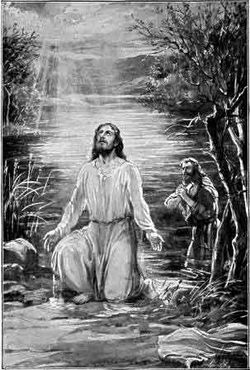Template:Priestkingheir
Heir Priest and King
The word "Christ" meant anointed and therefore the Kings of Israel who were anointed. To Call Jesus the Christ was to call him Messiah and King. The Pharisees and Herod had instituted a system of Corban through the power of the priesthood and the civil law in order to exercise authority[1] of the king over the people to provide welfare, benefits, and dainties.
Such systems of legal charity were a snare and a trap according to Proverbs, David, and Paul. They would entangle the people in the elements of the world, returng them to the bondage of Egypt.

Rabbinical Baptism had long been a custom in Jewish history to ritually accept a change in status.
In Matthew 3:4 John's "raiment of camel's hair" was likely made of Bactrian camel's hair which was common in Parthia, the hereditary enemy of Rome. And "a leathern girdle about his loins" also suggests Parthian priest[4] wearing a "Hemyan" belt. [5]
Also the idea of "his meat was locusts and wild honey" is not about eating bugs but Carob.[6]
Soba was said to be the daughter of Matthan and mother of Elisabeth, who was the mother of John the Baptist. This also made Joseph "Mary’s first cousin, once removed, as they shared the same grandfather, Matthan" See (Matthew 1:15)
This made them both descended from both Judean and Parthian royalty and priesthood. See Jesus
Because Zacharias was murdered his office as priest passed to John his son who became John the Baptist. With a murder in the temple and the Sanhedrin in disarray, with the proper bloodline and the blessings of the Megistanes we can assume that the office of high priest in Judea and in Parthia passed to John the Baptist. If the reference in Matthew 3:4 concerning John's "raiment of camel's hair" was made of Bactrian camel's hair which was common in Parthiaand the "leathern girdle about his loins" was the famous traditional "Hemyan" belt[5] we may safely assume he became a Parthian priest while hiding in Asia safe from assassination by Jews or Romans.
The wise men of Matthew 2 seems to be the Megistanes[7] who saw Jesus as the descendent of Phares, King David, and Matthan the technical heir to the Parthian throne.
When John the Baptist was executed then Jesus automatically became his successor as the one who was to come after him.[8] This would make Jesus as the Christ both High Priest and King and as the righteous king of peace and the Son of God.[3]
- ↑ Not exercise authority
- Matthew 20:25 "But Jesus called them unto him, and said, Ye know that the princes of the Gentiles exercise dominion over them, and they that are great exercise authority upon them. But it shall not be so among you:..."
- Mark 10:42 "But Jesus called them to him, and saith unto them, Ye know that they which are accounted to rule over the Gentiles exercise lordship over them; and their great ones exercise authority upon them. But so shall it not be among you:..."
- Luke 22:25 "And he said unto them, The kings of the Gentiles exercise lordship over them; and they that exercise authority upon them are called benefactors. But ye [shall] not [be] so:..."
- ↑ Luke 7:20 When the men were come unto him, they said, John Baptist hath sent us unto thee, saying, Art thou he that should come? or look we for another?
- ↑ 3.0 3.1 Priest and king
- Hebrews 5:6 As he saith also in another [place], Thou [art] a priest for ever after the order of Melchisedec.
- Hebrews 7:1 For this Melchisedec, king of Salem, priest of the most high God, who met Abraham returning from the slaughter of the kings, and blessed him;... 17 For he testifieth, Thou [art] a priest for ever after the order of Melchisedec.... 21 (For those priests were made without an oath; but this with an oath by him that said unto him, The Lord sware and will not repent, Thou [art] a priest for ever after the order of Melchisedec:)
- Psalms 110:4 The LORD hath sworn, and will not repent, Thou [art] a priest for ever after the order of Melchizedek.
- ↑ The Parthian Empire stretched from central Asia to Mesopotamia, and from the Caucasus to the Persian Gulf, and kept Roman expansionism in check for roughly 400 Years.
- ↑ 5.0 5.1 "Geo Widengren distinguishes between the Parthian kamar, a sword or tunic belt, and the hemyān, or sacred girdle worn by priests (Widengren, p. 254)." “BELTS,” Encyclopaedia Iranica, IV/2, pp. 130-136.
- ↑ The eastern Mediterranean region has a tree, cultivated from the pea family (Fabaceae), called Carob (Ceratonia siliqua) produces an edible pod identified as a "locust" bean or "St. John's bread". So carob was not a bug and the honey may be what was called "date honey".
- ↑ King of the Megistanes
- Matthew 2:10 When they saw the star, they rejoiced with exceeding great <3173> joy.
- Matthew 4:16 The people which sat in darkness saw great <3173> light; and to them which sat in the region and shadow of death light is sprung up.
- Matthew 5:19 Whosoever therefore shall break one of these least commandments, and shall teach men so, he shall be called the least in the kingdom of heaven: but whosoever shall do and teach [them], the same shall be called great <3173> in the kingdom of heaven.
- Matthew 5:35 Nor by the earth; for it is his footstool: neither by Jerusalem; for it is the city of the great <3173> King.
- ↑ Matthew 3:11 I indeed baptize you with water unto repentance: but he that cometh after me is mightier than I, whose shoes I am not worthy to bear: he shall baptize you with the Holy Ghost, and [with] fire: